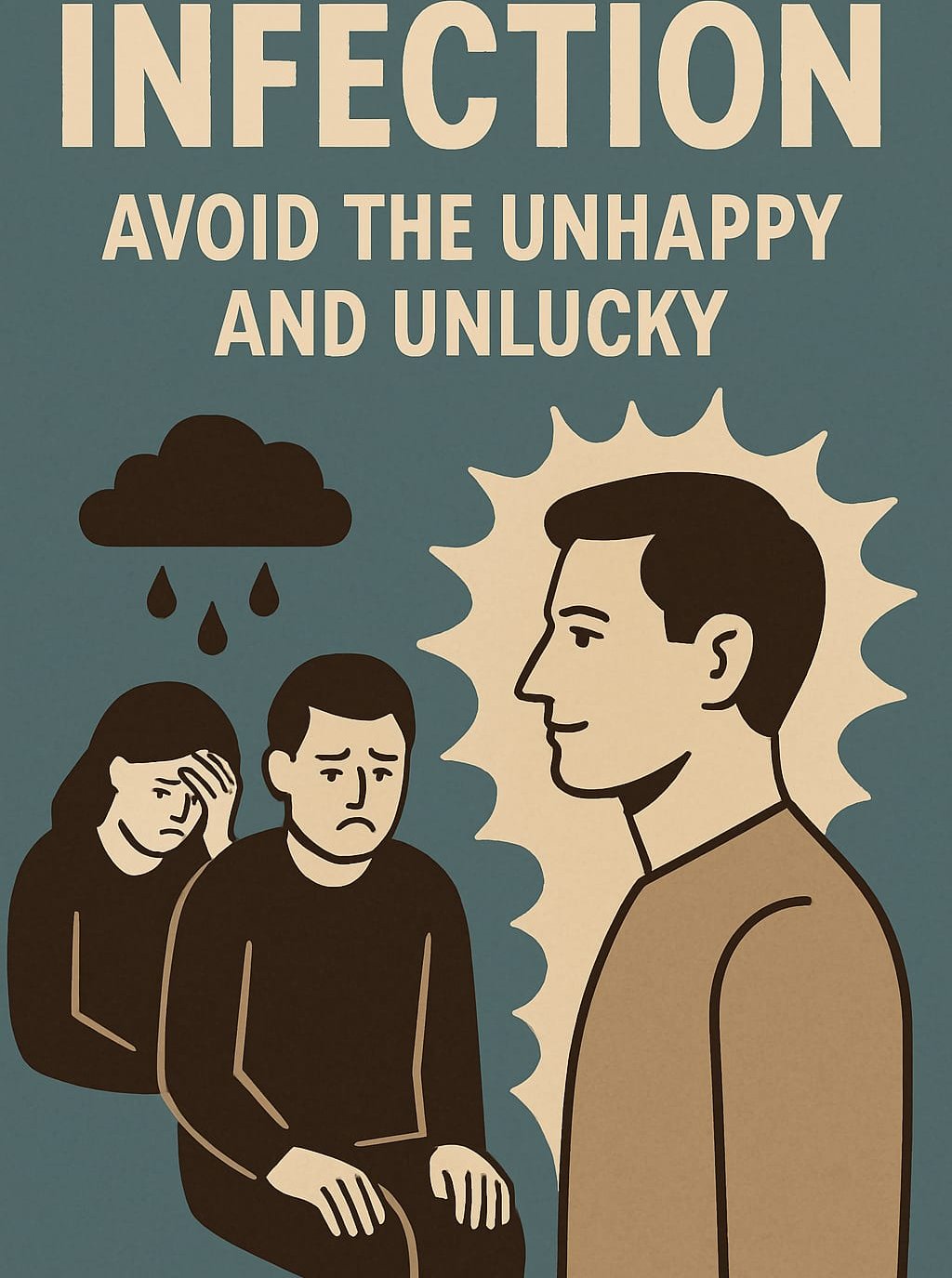The Silent Infection: How Negative People Drain Your Power.
Not all infections are physical—some are emotional and psychological. This post dives deep into the hidden dangers of surrounding yourself with chronically negative, unhappy, or “unlucky” individuals. Drawing from real-life observations and timeless principles, we explore how the energy of others can influence your mindset, choices, and destiny. Discover why protecting your mental space from emotional “toxins” is essential—and how to cultivate relationships that uplift and empower you instead.
SELF-EVOLUTION


You can catch someone else's misery just as easily as you can catch a cold. It’s easy to think you’re saving someone in distress, but often you’re only setting yourself up for disaster. Those who attract misfortune can pull you down with them—surround yourself instead with the happy and fortunate.
Born in the charming city of Limerick, Ireland, in 1818, Marie Gilbert sought her fortune in Paris in the 1840s, aiming to dazzle as a dancer and performer. Adopting the stage name Lola Montez, thanks to her mother's distant Spanish roots, she spun tales of her fiery flamenco dancing straight from Spain. However, by 1845, Lola found her career stalling. To survive, she turned to a life of luxury as a courtesan, quickly establishing herself as one of Paris’s most notable companions.
But there was one man who could reignite her dancing career: Alexandre Dujarier, the influential owner of France’s most popular newspaper and its drama critic. Lola embarked on a mission to win his heart. After researching his habits, she discovered he enjoyed riding every morning. An excellent horsewoman, she risked it all one day and “accidentally” bumped into him while out for a ride. Their daily rides turned into an undeniable bond, and before long, Lola moved into his apartment.
For a time, their love bloomed beautifully. With Dujarier’s support, Lola revived her dancing career, fueling hope for a shared future while he vowed to marry her come spring. Yet, Lola had a secret—she had eloped at nineteen and was still married, a truth she kept hidden from him. As Dujarier fell deeper in love, his life began to spiral downward. Financial troubles struck, and the elite started to distance themselves from him.
One fateful evening, Dujarier was invited to a lavish party filled with Paris’s elite. Lola, eager to join, was met with resistance, leading to their first quarrel. He attended the party alone, where he, fueled by liquor, ended up insulting a prominent drama critic, Jean-Baptiste Rosemond de Beauvallon, perhaps driven by something that had been said about Lola. In the harsh light of morning, Beauvallon challenged him to a duel. Dujarier attempted an apology, but it was too late—the duel took place, and he lost his life, leaving behind a shattered Lola.
Devastated, Lola fled to Munich in 1846, where she set her sights on a new conquest: King Ludwig of Bavaria. She quickly devised a plan, discovering that his aide-de-camp, Count Otto von Rechberg, had a soft spot for beautiful women. During breakfast at an outdoor café, Lola made a dramatic entrance by "accidentally" falling from her horse right at Rechberg's feet. The count, smitten, arranged an introduction to the king.
However, when Lola arrived for her audience, she heard Ludwig declaring he didn’t have time for a stranger seeking favours. Undeterred, she boldly pushed past the guards and entered the room—only to have her dress torn in the frenzy, exposing her bare breasts to the astonished king. Despite the scandal, Lola charmed her way into Ludwig’s favour, and within fifty-five hours, she made her debut on the Bavarian stage. The reviews were dismal, yet Ludwig was captivated, arranging more performances for her.
Ludwig, in his own words, was “bewitched” by Lola. He started flaunting her in public and even furnished a lavish apartment for her in one of Munich’s most prestigious neighbourhoods. He transformed from a miserly king to one who showered Lola with gifts and penned her poetry. Overnight, she ascended to fame and fortune—but with power came a change in her demeanour.
One day, frustrated behind a slow-moving elderly man on horseback, Lola lashed out at him with her riding crop. On another occasion, her unleashed dog attacked a passerby, and instead of aiding the victim, she retaliated by whipping him with the leash. Such brazen behaviour incited outrage among the Bavarian citizens, yet Ludwig remained unwavering in his support, even going so far as to have her naturalized as a Bavarian citizen.
As discontent brewed in Bavaria, those who dared to criticize Lola found themselves dismissed from the king's court. Citizens revolted against their beloved monarch, chanting “Raus mit Lola!” as unrest rippled through the kingdom. By February 1848, Ludwig, unable to withstand the mounting pressure, made the heart-wrenching decision to banish Lola from Bavaria, ending a tumultuous chapter marked by passion, power, and chaos.
